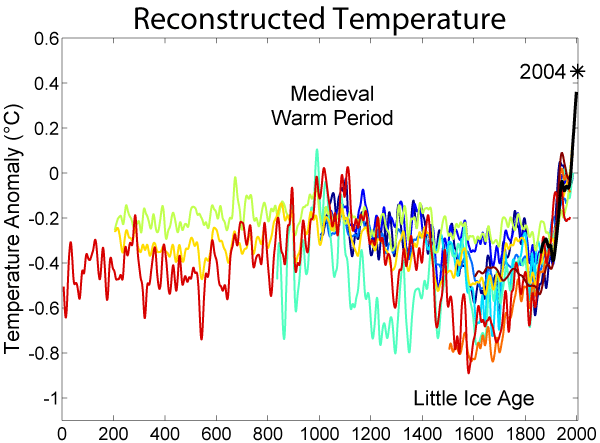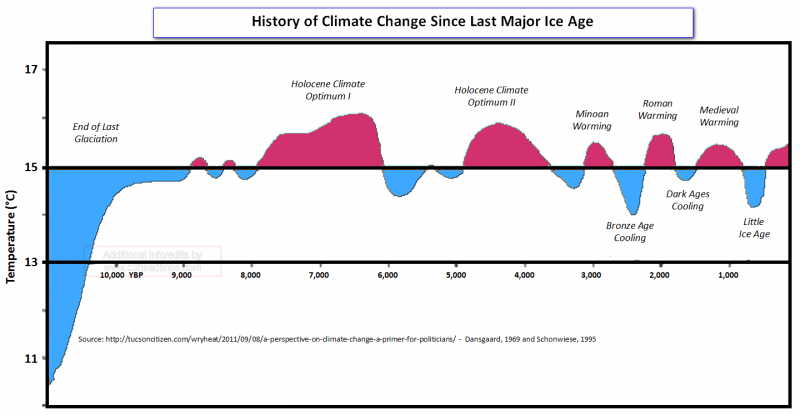You are here: Cops>Common Web>CommonProjects>ClimateChange (12 Mar 2018, RaymondLutz)Edit Attach
Climate Change
Direct link to this page: https://copswiki.org/Common/ClimateChangeSee also: Energy Policy
Summary of Popular Climate Theory
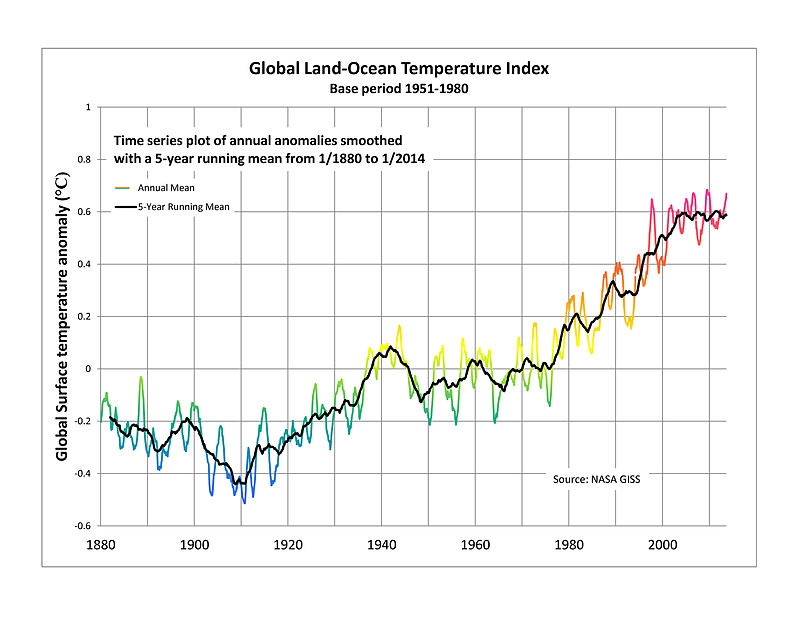
Warming trendFirst, we take a look at a plot of global temperature 1880. There is a clear warming trend, although in the mid 1940s the climate was cooler for a while, and in recent years, it has flattened. But overall, the trend is nearly monotonic. |
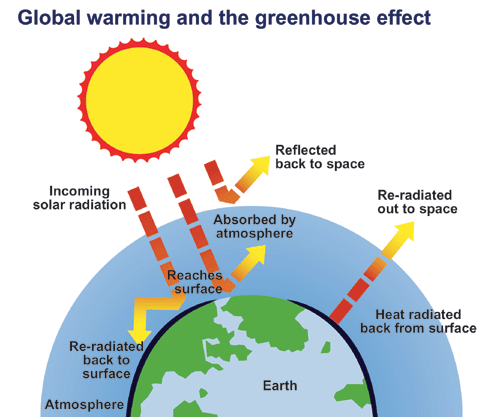
Greenhouse Effect BasicsThe leading theory is based on the "Greenhouse Effect. Increased greenhouse gases (GHG), such as Carbon Dioxide (CO2) theoretically results in an increase in temperature. Solar energy goes in but is kept in due to the blanket-like action of those GHG. |
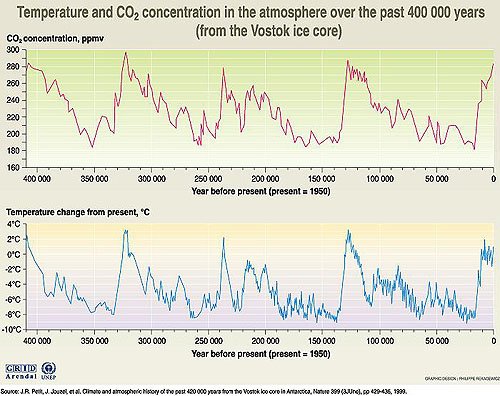
CO2 and Temperature SynchronizationIt is pretty clear that temperature and CO2 move in unison over historical record of about 400,000 years. Some people say that it appears that CO2 "follows" the temperature curve (higher CO2 results from higher temperature) rather than the more popular idea that the temperature follows CO2 levels. But this may also be due to the way the data was gathered. |
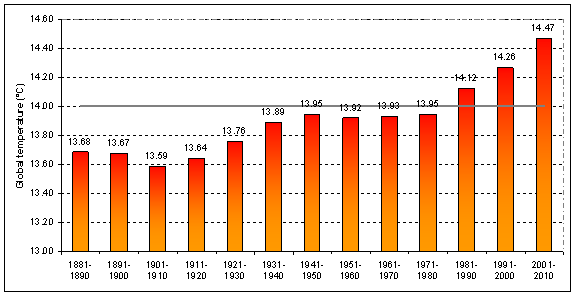
Hottest Decade on RecordClimate science is relatively new and there are still many questions to be answered. But no one really resists the concept that a warming trend does exist. We may see temperature ups and downs, but the recent decade was the hottest one in our recent records. Those companies that wish to continue to pollute will push against the realization that human activities do impact the climate and is definitely at least a contributor to the global warming trends. There is a overwhelming scientific consensus that human caused emissions, so-called "anthropogenic" emissions are the most important forcing cause of climate change. But there is an orchestrated agenda to undermine this consensus by the "denier" crowd. For more details, start with this lecture, presenting an excellent historical overview of the established scientific consensus that global warming exists, and it is driven by green-house gases produced by burning fossil fuels.
|
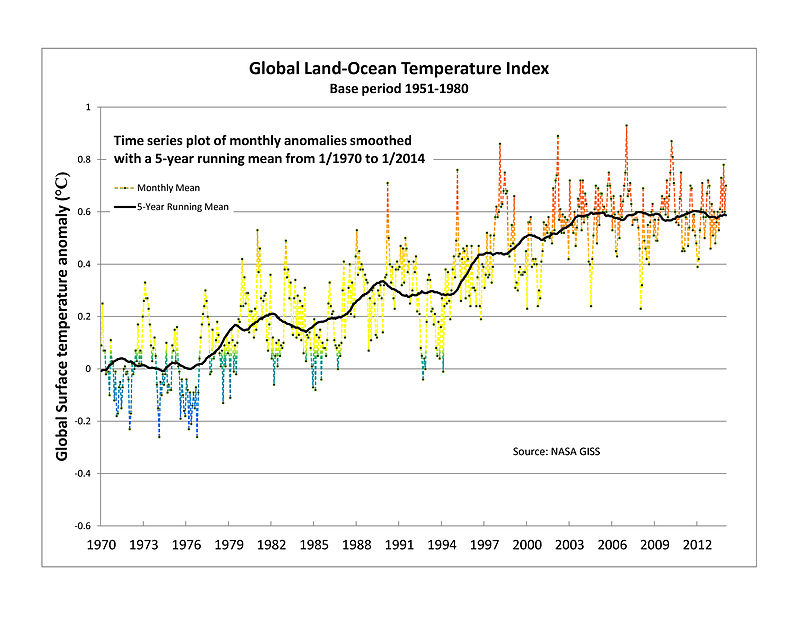
Plot of Warming since 1970The plot of global surface temperatures since 1970 clearly shows a flattening of the curve in recent years, drawing claims that we are experiencing a "pause" in the trend predicted due to GHG emissions, which are off the charts. |
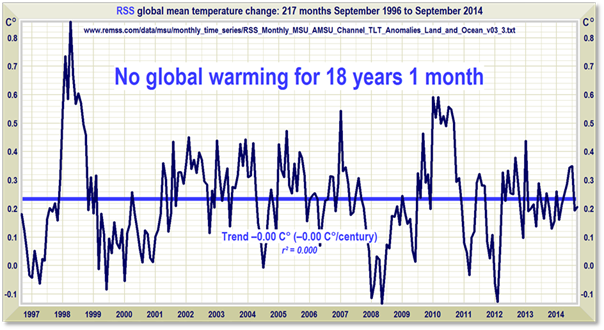
A Pause?By carefully selecting the starting point, recent data can be viewed in isolation to seem to show a pause in warming. Indeed, this was unexpected. |
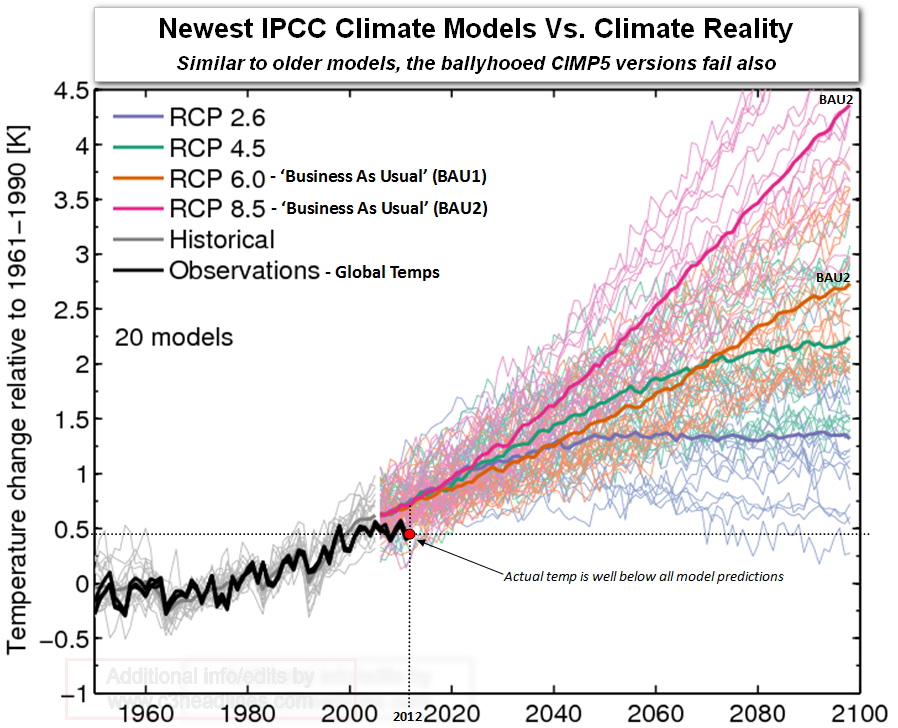
IPCC Climate Models vs. ObservedThe recent "pause" in the expected warming is now in stark variance with estimates of the temperature as proposed by IPCC Climate Models. However, these climate models are only rough estimates using if-then scenarios. Many scientists are now proposing that the oceans play a much larger role in absorbing the heat, as well as the energy absorbed by melting glaciers and the ice in Greenland and the arctic. These theories still need to be included in the models so they will accurately model the "pause" being seen. Several papers now state that although we are experiencing a pause, it likely will not happen again for many decades. |
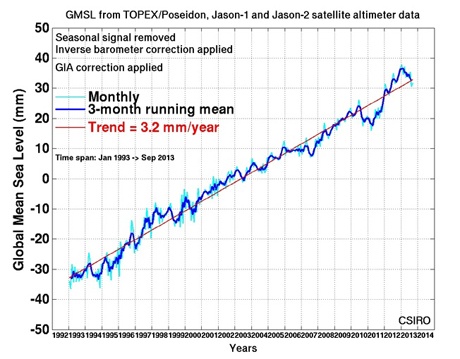
Sea Level Increasing monotonicallyThe sea level is increasing on a monotonic basis, largely due to expansion of the water due to increased temperatures, rather than due to additional water added from melting inland ice. Arctic ice or ice berg melting does not add to the sea level as this ice is floating, whereas ice melting from inland Antarctica and Greenland will add to sea levels. |
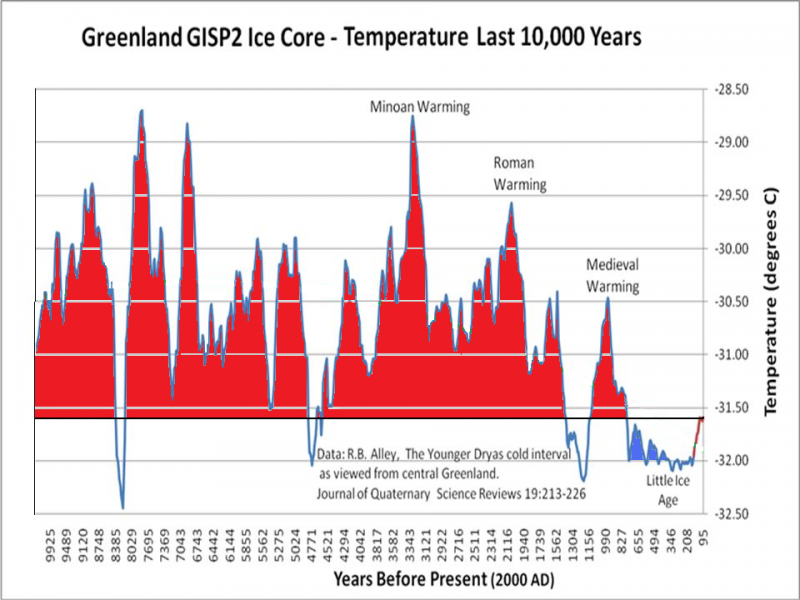
Longer global climate historyScientists have reconstructed global temperatures over a 10,000 year period from Greenland ice cores. Surprisingly, it shows that we are in a relatively cold period. |
|
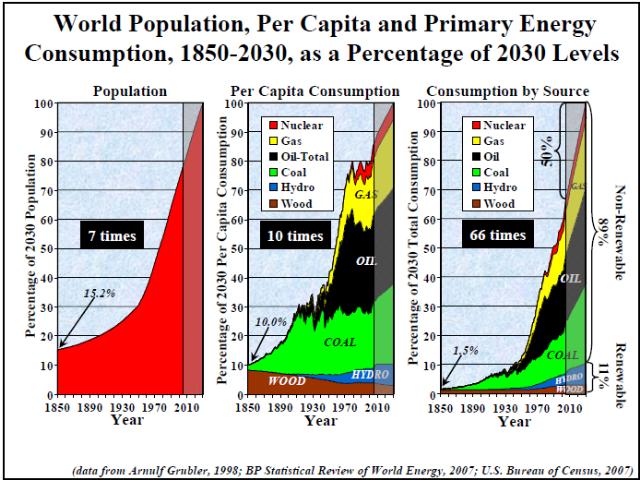
What is driving this?The major scientific theory is that greenhouse gases are driving climate change. There is widespread agreement among climate scientists that these emissions are driving climate change. Of course there are many who disagree with this theory, and it can be argued that they are underwritten by the fossil fuel industry. But for the purposes of this article, we will go along with the leading theory. What is driving the use of fossil fuels, and do we have a hope of reducing it? The primary drivers of increases in fossil fuel use is the increase in world population and the increases in per-capita energy use. The result is that in recent decades, the population has increased seven times over, and the use per-capita has increased nearly 10 times, resulting in use up by 66 times. There is no end in sight to the population surge but this will wind up being the most important single issue in the future for many reasons in addition to energy use. Family planning, contraceptives, and safe and easily available abortions will all be essential. Increases in women's rights tends to also result in smaller families. In terms of per-capita energy use, much of the increase is due to the undeveloped world increasing their use of energy. Highly developed areas, such as California, have remained flat in terms of energy use in recent years. So once undeveloped areas start to use energy, they main driver will then continue to be the population. |
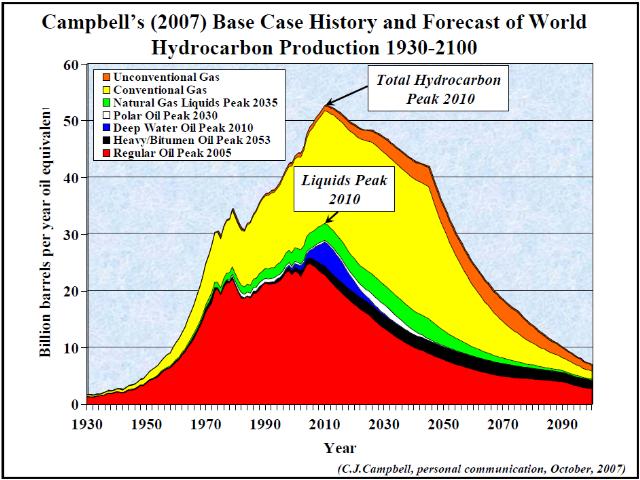
Fossil Fuels Face DepletionExperts disagree on the exact date, but over the next decades, we will face the depletion of many sources of fossil fuels. In recent years, we have seen new technologies, such as "fracking" which can remove additional natural gas from wells that were previously believed to be depleted. This practice has many drawbacks, and is poorly regulated in terms of the chemicals used in the toxic mix injected in these wells to release additional gas, and there has been linkages to increased earthquakes in those areas. Thus, getting the last few drops of oil, puffs of gas, and blocks of coal, will have substantial negative impacts on the environment. But regardless of the exact date, there is no question that eventually we will deplete resources, at least to the extent that it costs more energy to extract it than we get out. When that happens, it is not worth taking the fuel out of the ground. The chart shown here is an estimate from experts on the likely curve of production of fossil fuels. As we go past "peak oil" and go down the downside of the curve, the cost goes up accordingly. |
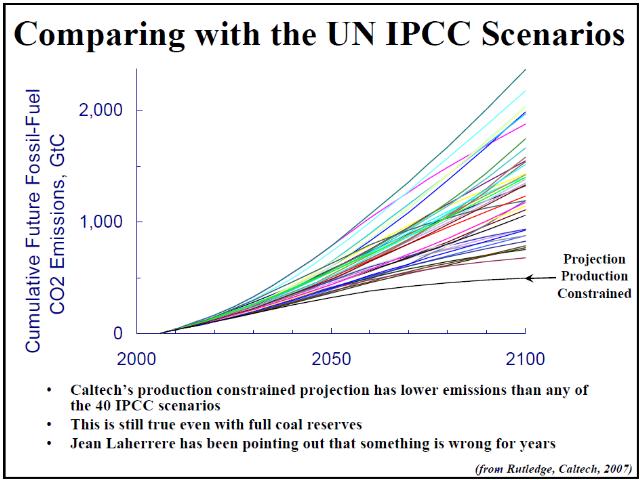
Resource Depletion Not Included In Climate Models.As climate models are if-then scenarios, they do not necessarily include the fact of fossil fuel depletion mentioned above. Although running out of those fuels sounds like a really bad thing, it is a good thing when it comes to the outlook of climate change. When Cal Tech included resource depletion in climate models, the curve, at the bottom, is much "better" than any of the other climate models whci assume we have unlimited fossil fuel supplies. Thus, climate change will only get so bad, even if we use up all fossil fuels that are economically viable to produce. But it will still be significant. |
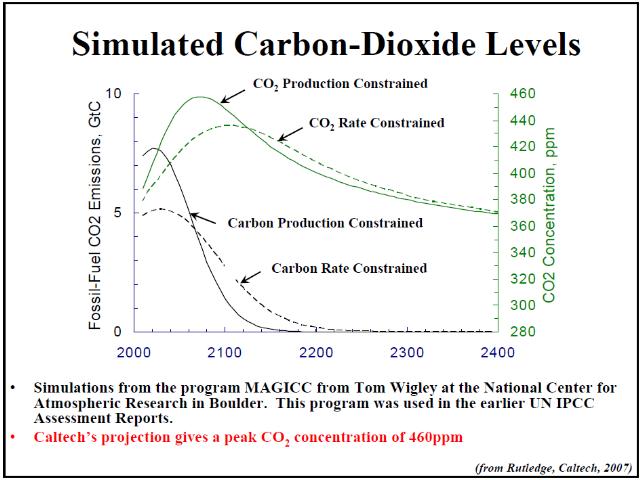
CO2 Levels Kept downGiven the natural limit to the fossil fuels available, CO2 levels only go so high. If we struggle to limit fossil fuel use now, the curves are held down a bit and the implications of climate change can be mitigated somewhat. However, if we are unsuccessful in making those changes, then the fact that fossil fuels are limited keep CO2 levels down in these simulations. Please understand that all these climate models are FAR FROM COMPLETE and are nearly impossible to get right because our climate is very complex. |
-
 (GreatGlobalWarmingSwindle) Great Global Warming Swindle -- Martin Durkin, Martin Durkin,
(GreatGlobalWarmingSwindle) Great Global Warming Swindle -- Martin Durkin, Martin Durkin,
- Discussion of how random cloud effects may look like positive feedback but really are not: http://climatesci.colorado.edu/2007/08/14/positive-feedback-have-we-been-fooling-ourselves-by-roy-spencer
- Book I want to get: "Human Impacts on Weather and Climate" - http://www.cambridge.org/catalogue/catalogue.asp?isbn=9780521600569
- RoyalSocietyPaperOnSolarActivityVsClimateChange.pdf: The Royal Society: "Recent oppositely directed trends in solar climate forcings and the global mean surface air temperature " Lockwood & Frolich
There are many interesting palaeoclimate studies that suggest that solar variability had an influence on pre-industrial climate. There are also some detection–attribution studies using global climate models that suggest there was a detectable influence of solar variability in the first half of the twentieth century and that the solar radiative forcing variations were amplified by some mechanism that is, as yet, unknown. However, these findings are not relevant to any debates about modern climate change. Our results show that the observed rapid rise in global mean temperatures seen after 1985 cannot be ascribed to solar variability, whichever of the mechanisms is invoked and no matter how much the solar variation is amplified.
Recent Articles and Media: (Add | All Media)
Number of topics: 15
-
 (M1268) 2011-10-29 Why do tornados and hailstorms rest on weekends? -- Daniel Rosenfeld, Thomas L. Bell, JOURNAL OF GEOPHYSICAL RESEARCH, VOL. 116, Tornados and hailstorms are stronger and more prevalent during the week.
(M1268) 2011-10-29 Why do tornados and hailstorms rest on weekends? -- Daniel Rosenfeld, Thomas L. Bell, JOURNAL OF GEOPHYSICAL RESEARCH, VOL. 116, Tornados and hailstorms are stronger and more prevalent during the week.
-
 (M1177) 2011-04-04 The Machinery of Climate Anti-Science -- John R Mashey, ,
(M1177) 2011-04-04 The Machinery of Climate Anti-Science -- John R Mashey, ,
-
 (M877) 2009-10-27 Statisticians reject global cooling -- SETH BORENSTEIN, Associated Press,
(M877) 2009-10-27 Statisticians reject global cooling -- SETH BORENSTEIN, Associated Press,
-
 (M852) 2009-09-23 Taking a bite out of climate data -- Patrick J. Michaels, National Review Online,
(M852) 2009-09-23 Taking a bite out of climate data -- Patrick J. Michaels, National Review Online,
-
 (M855) 2009-06-20 On the Rates of Sea Level Rise -- Clues from the distant past -- Wolfgang Berger, Scripps Institution Of Oceanography,
(M855) 2009-06-20 On the Rates of Sea Level Rise -- Clues from the distant past -- Wolfgang Berger, Scripps Institution Of Oceanography,
-
 (M658) 2008-10-13 Foreign Liquefied Natural Gas -- Amita Sharma Amy Isackson, Kpbs News,
(M658) 2008-10-13 Foreign Liquefied Natural Gas -- Amita Sharma Amy Isackson, Kpbs News,
-
 (M635) 2008-09-11 Drilling – Fool's Gold -- Raymond Lutz, East County Californian,
(M635) 2008-09-11 Drilling – Fool's Gold -- Raymond Lutz, East County Californian,
-
 (M719) 2007-12-20 The American Denial of Global Warming -- Naomi Oreskes, Ph.D., Ucsd Tv, Important encapsulation of Global Warming issue and the plan to undermine it.
(M719) 2007-12-20 The American Denial of Global Warming -- Naomi Oreskes, Ph.D., Ucsd Tv, Important encapsulation of Global Warming issue and the plan to undermine it.
-
 (M657) 2007-09-24 Biofuels: The Science of Creating Greener Energy -- , Ucsd Tv Molecules For The Media,
(M657) 2007-09-24 Biofuels: The Science of Creating Greener Energy -- , Ucsd Tv Molecules For The Media,
-
 (M147) 2007-08 Global Warming: Man-Made or Natural? -- S Fred Singer, Hillsdale College, Suggests anthropogenic climate change should be questioned. Written by Fred Singer, who also worked to minimize the dangers of cigarette smoking, etc.
(M147) 2007-08 Global Warming: Man-Made or Natural? -- S Fred Singer, Hillsdale College, Suggests anthropogenic climate change should be questioned. Written by Fred Singer, who also worked to minimize the dangers of cigarette smoking, etc.
-
 (M77) 2007-07-19 Climate trail goes cold at sun? -- Warming concerns not linked to star -- Brian Handwerk, Union Tribune, [This article refutes the claims that the rise in temps are due to solar activity.]
(M77) 2007-07-19 Climate trail goes cold at sun? -- Warming concerns not linked to star -- Brian Handwerk, Union Tribune, [This article refutes the claims that the rise in temps are due to solar activity.]
- (M677) 2007-07-15 Cadem Resolution: Support Clean Energy -- Dante Atkins, delegate, 42nd Assembly District, Andrew Lachman; Democrats for Israel Los Angeles, Cadem Resolutions Committee,
- (M678) 2007-07-15 Cadem Resolution: Opposing Coal Liquefaction -- Dante Atkins, DSCC Member, AD-42, and Platform Committee Member, Cadem Resolutions Committee,
- (M680) 2007-07-15 Cadem Resolution: Local Planning to End Global Warming -- Luke Breit, Chair, CDP Environmental Caucus, Cadem Resolutions Committee,
-
 (GreatGlobalWarmingSwindle) Great Global Warming Swindle -- Martin Durkin, Martin Durkin,
(GreatGlobalWarmingSwindle) Great Global Warming Swindle -- Martin Durkin, Martin Durkin,
Comments
Project Form edit
| Project Name | Climate Change |
| Project Description | Investigation into the debate over anthropogenic climate change based on Greenhouse gasses. |
| Project Founder | Raymond Lutz |
| Project Curator | Raymond Lutz |
| Project Type | Issue Oversight |
| Project Parents | Energy Policy |
| Related Keywords | |
| Project Status | Active |
| Thumbnail Link | |
| Forum Link | |
| List Serve Topic |
| I | Attachment | Action | Size | Date | Who | Comment |
|---|---|---|---|---|---|---|
| |
2000_Year_Temperature_Comparison.png | manage | 38 K | 25 Nov 2014 - 02:18 | Raymond Lutz | Warming trends for 2000 years |
| |
GreenlandIceCore.png | manage | 273 K | 25 Nov 2014 - 02:20 | Raymond Lutz | 10,000 years of global temperature history from greenland ice cores |
| |
IPCC_Climate_Models_vs_Actual_Observations.png | manage | 409 K | 25 Nov 2014 - 03:34 | Raymond Lutz | IPCC Climate Models vs. Observed |
| |
RoyalSocietyPaperOnSolarActivityVsClimateChange.pdf | manage | 536 K | 26 Jun 2014 - 21:23 | Raymond Lutz | The Royal Society: "Recent oppositely directed trends in solar climate forcings and the global mean surface air temperature " Lockwood & Frolich |
| |
Warming_since_1880_yearly.jpg | manage | 65 K | 25 Nov 2014 - 02:17 | Raymond Lutz | Plot of global warming trends since 1880 |
| |
Warming_since_1970.jpg | manage | 84 K | 25 Nov 2014 - 02:17 | Raymond Lutz | Plot of Warming since 1970 |
| |
basicGHGwarming.gif | manage | 37 K | 25 Nov 2014 - 02:15 | Raymond Lutz | Basic Greenhouse Effect Graphic |
| |
clip_image002_thumb.png | manage | 155 K | 25 Nov 2014 - 02:22 | Raymond Lutz | Recent data can be viewed in isolation to seem to show a pause in warming |
| |
global-cooling-graph-719171.jpg | manage | 62 K | 25 Nov 2014 - 03:40 | Raymond Lutz | Climate history for about 4000 years |
| |
historyOfClimateChangeSinceLastMajorIceAge.png | manage | 87 K | 25 Nov 2014 - 02:21 | Raymond Lutz | History of climate change since the last major ice age. |
| |
hottest_decade_on_record.gif | manage | 12 K | 25 Nov 2014 - 03:36 | Raymond Lutz | Hottest Decade on Record |
| |
img65.jpg | manage | 45 K | 06 Mar 2015 - 19:49 | Raymond Lutz | Climate change if resource depletion is included in models |
| |
img66.jpg | manage | 43 K | 06 Mar 2015 - 19:54 | Raymond Lutz | Simulated CO2 levels with resource-depletion included in the models (Caltech) |
| |
img68.jpg | manage | 57 K | 06 Mar 2015 - 19:52 | Raymond Lutz | Fossil fuels will not last forever, depletion to occur in the next century. |
| |
img77.jpg | manage | 64 K | 06 Mar 2015 - 19:51 | Raymond Lutz | Population and increases on per-capita basis is driving energy use sky high. |
| |
sea_level_guardian.jpg | manage | 61 K | 25 Nov 2014 - 03:38 | Raymond Lutz | Sea Level Increasing monotonically |
| |
vostok.jpg | manage | 54 K | 25 Nov 2014 - 03:42 | Raymond Lutz | Temperature and CO2 move in unison over historical record |
Edit | Attach | Print version | History: r28 < r27 < r26 < r25 | Backlinks | View wiki text | Edit wiki text | More topic actions
Topic revision: r28 - 12 Mar 2018, RaymondLutz
 Copyright © by the contributing authors. All material on this collaboration platform is the property of the contributing authors.
Copyright © by the contributing authors. All material on this collaboration platform is the property of the contributing authors. Ideas, requests, problems regarding Cops? Send feedback


